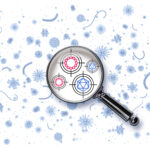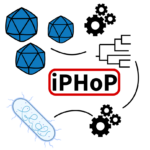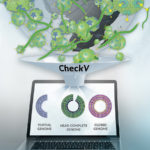Mobile genetic elements (MGEs) are genetic entities that seek to replicate themselves and spread from cell to cell. Two of the most common forms of MGEs are viruses and plasmids. They can be found in virtually all of Earth’s ecosystems. A software tool recently described in Nature Biotechnology called geNomad identifies and classifies MGEs based upon their gene content and their genetic sequences. The software was created by researchers under the direction of JGI Microbiome Data Science Group Lead Nikos Kyrpides.
JGI Creates a New Matchmaker for Phages and their Hosts
To do anything, viruses must find a host, and not just any host will do. It must be a specific host the virus has adapted to commandeer. For bacteriophage viruses, these hosts are microbes like bacteria, not humans. With metagenomic sequencing, researchers have found more of these viruses than ever before, in all kinds of ecosystems. However, matching these viral genetic sequences to their hosts is crucial to understanding what these viruses can do. Building on existing virus-host prediction approaches, researchers have created a new program called iPHoP (pronounced “eye-pop”, freely available online).
JGI Adds Actinobacteria Chapter in the Genomic Encyclopedia of Bacteria and Archaea
In Cell Genomics, an international consortium led by researchers at the Joint Genome Institute team generated 824 new Actinobacteria genomes, which were were combined with nearly 5,000 publicly available ones and 1,100 metagenome-assembled genomes (MAGs) reconstructed from sequenced environmental samples in a previous study.
JGI’s CheckV Tool to Assess Virus Data Quality
Assembling viral genomes from metagenomes is challenging and often results in highly fragmented data, which limits the ability of researchers to accurately perform functional assessment, host prediction, and phylogenetic analysis. As reported in Nature Biotechnology, a team including JGI’s Stephen Nayfach, Frederik Schulz, Emiley Eloe-Fadrosh, Simon Roux and Nikos Kyrpides developed an automated tool called CheckV (pronounced “Check-Vee”) to help researchers assess and improve the quality of metagenome-assembled viral genomes. CheckV has already been applied to over 2.4 million viral genomes available in the latest release of IMG/VR, a database that is part of the Integrated Microbial Genomes & Microbiomes (IMG/M) suite. Learn more here on the JGI website.
JGI Leads Large-Scale Effort to Develop a Genomic Catalog of Earth’s Microbiomes
Microorganisms play key roles in regulating global nutrient cycles but only a small fraction has been identified and an even smaller number has been successfully cultured in a lab for study. In Nature Biotechnology, the known diversity of bacteria and archaea has now expanded by 44% through a publicly available collection of more than 52,000 microbial genomes from environmental samples. Of that number, 70% of the novel genome sequences were previously unknown, not yet cultured in the lab. The work results from a JGI-led collaboration involving more than 200 scientists around the world, KBase and NERSC. Read more about the genomic catalog of Earth’s microbiomes on the JGI website.
Was this page useful?








